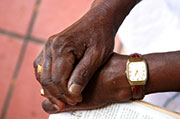- Double Mastectomy May Offer No Survival Benefit to Women With Breast Cancer
- Toxic Lead Found in Cinnamon Product, FDA Says
- Certain Abbott Blood Sugar Monitors May Give Incorrect Readings
- Athletes Can Expect High Ozone, Pollen Counts for Paris Olympics
- Fake Oxycontin Pills Widespread and Potentially Deadly: Report
- Shingles Vaccine Could Lower Dementia Risk
- Your Odds for Accidental Gun Death Rise Greatly in Certain States
- Kids From Poorer Families Less Likely to Survive Cancer
- Tough Workouts Won’t Trigger Cardiac Arrest in Folks With Long QT Syndrome
- At-Home Colon Cancer Test Can Save Lives
Three Groups Miss Out on Colon Cancer Survival Gains, Study Says


Survival rates for white and Asian patients with advanced colon cancer have improved significantly, but the benefits haven’t extended to blacks and Hispanics, according to an American Cancer Society study.
The researchers also found that survival rates for white patients aged 65 and older did not increase as much as for those aged 20 to 64.
The findings suggest a need to increase access to new treatments for patients in these minority groups as well as for older patients, the study authors said.
“We know from previous studies that when people of any race get equal care they have similar outcomes. But studies show there are significant inequalities in the dissemination of new treatments, likely leading to the gaps in survival our analysis found,” said study leader Dr. Helmneh Sineshaw.
For the study, published in the January issue of the journal Cancer Causes and Control, the investigators analyzed data from nearly 50,000 people with advanced colorectal cancer who were included in National Cancer Institute registries.
Five-year survival rates among whites rose from less than 10 percent in the years 1992-1997 to nearly 16 percent in 2004-2009. During the same time frame, survival rates among Asian patients increased from about 11 percent to almost 18 percent, the study found.
But the picture was less rosy for blacks and Hispanics. Survival rates rose only from 8.6 percent to 9.8 percent among blacks and from 14 percent to 16.4 percent among Hispanics during the study period. Those increases were not statistically significant, the researchers pointed out.
“The reasons why ethnic minorities are not getting equal treatment are complicated, but likely include poorer health coming into the system, and lower socioeconomic status, which clearly leads to barriers to good health care. Those same factors likely lead to less aggressive treatment for older patients, as well,” Sineshaw explained in a journal news release.
Dr. Richard Wender, chief cancer control officer of the cancer society, said the study reveals what happens when not everyone is given the best care available.
“We need a concerted effort to make sure all Americans, regardless of skin color, age, or socioeconomic status, reap the lifesaving benefits of better care,” Wender said in the news release.
More information
The U.S. National Cancer Institute has more about colorectal cancer.
Source: HealthDay
Copyright © 2024 HealthDay. All rights reserved.










